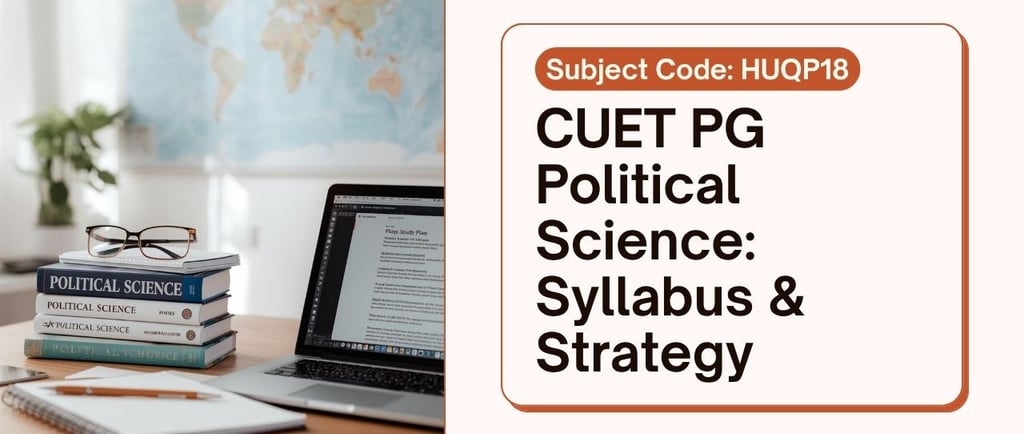CUET PG Political Science: Complete Guide (Syllabus, Pattern, Tips & More)
9/3/20252 min read


Are you preparing for CUET PG Political Science (HUQP18) and looking for a one-stop guide? Whether you are aiming for admission to a top central university or want to know everything you need — CUET PG Political Science syllabus, CUET PG Political Science exam pattern, CUET PG Political Science preparation tips, CUET PG Political Science eligibility, CUET PG Political Science topics, CUET PG Political Science books list — this guide has got you. In this post, you will get the official syllabus, important topics, exam pattern, preparation tips, recommended books, and what changes to expect in CUET PG 2025 / 2026. Read on to get started.
What is CUET PG Political Science (HUQP18)?
Exam Name & Code: Common University Entrance Test for Post Graduate (CUET PG) — Political Science, Code HUQP18.
Purpose: For admission to MA / MPhil / other PG-level Political Science programmes in central universities and other participating institutes across India.
Conducting Body: The National Testing Agency (NTA) publishes the syllabus and pattern.
CUET PG Political Science Syllabus 2025 / 2026
Western Political Philosophy / Thought
Plato; Aristotle; Machiavelli; Hobbes; Locke; Rousseau; J.S. Mill; Karl Marx; John Rawls.
Indian Political Thought / Modern Indian Thought
Ram Mohan Roy; Gandhi; Ambedkar; Savarkar; Kautilya.
Political Theory
Concepts of liberty, equality, justice, sovereignty, citizenship and gender; democracy; human rights; state; contemporary issues; ideology like feminism etc.
International Relations
Realism & Liberalism; Cold War politics; NAM, SAARC, UNO, ASEAN, EU; India’s foreign policy (esp. with China, USA, Pakistan).
Indian Government and Politics
Preamble; making of Constituent Assembly; Constitutional Provisions; Parliament, Cabinet, President, Prime Minister; Fundamental Rights/Duties; Directive Principles; Amendments; Governor; State govt, Federalism; Political Parties; Judiciary; Elections; Local Government; Governance.
Comparative Government & Politics
Political culture; political parties; electoral systems; approaches/models; types of regimes.
Public Policies in India
Policy Models; Process; Types of public policy.
General Issues of Contemporary Relevance
Global justice; nationalism; climate change.
NOTE: Verify with the updated syllabus on the NTA website: Click
Exam Pattern & Key Details
Number of Questions: 75 MCQs (all compulsory) from the Political Science domain only.
Total Marks: 300 marks. (Usually +4 per correct answer)
Duration: 90 minutes.
Language: Bilingual – English & Hindi.
Negative Marking: Usually applies. Confirm in the current year’s Information Bulletin.
Eligibility Criteria
Bachelor’s degree or equivalent, no upper age limit. Universities may have specific minimum marks / subject requirements. Always check with the university you are applying to.
Best Books & Resources
Andrew Heywood — Political Theory. Link: https://fkrtt.in/en/HgBmB1
Rajeev Bhargava, Ashok Acharya - Political Theory: An Introduction. Link: https://fkrtt.in/en/mSw5EC
M. Laxmikanth — Indian Polity. Link: https://fkrtt.in/en/gfh2rO
Andrew Heywood, Ben Whithman -- Global Politics. Link: https://fkrtt.in/en/ahTIV2
Bidyut Chakrabarty, Rajendra Kumar Pandey -- Modern Indian Political Thought. Link: https://fkrtt.in/en/Ffddn8
O.P. Gauba -- Western Political Thought. Link: https://fkrtt.in/en/H3IhVj
D. Malone -- Does the Elephant Dance? Contemporary Indian Foreign Policy. Link: https://fkrtt.in/en/XMFq4s
